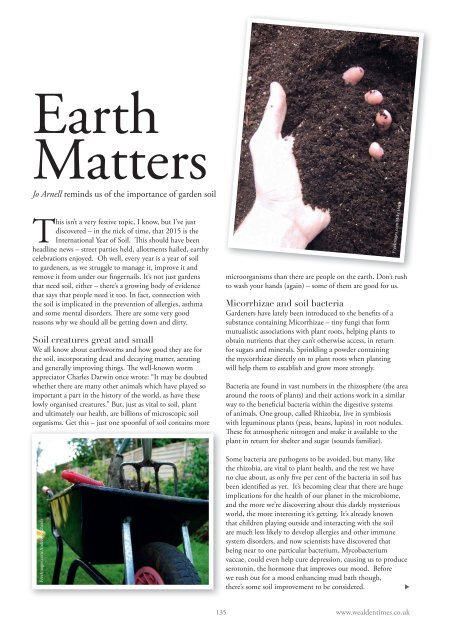Wealden Times | WT166 | December 2015 | Interiors supplement inside
Wealden Times - The lifestyle magazine for the Weald
Wealden Times - The lifestyle magazine for the Weald
Create successful ePaper yourself
Turn your PDF publications into a flip-book with our unique Google optimized e-Paper software.
Earth<br />
Matters<br />
Jo Arnell reminds us of the importance of garden soil<br />
This isn’t a very festive topic, I know, but I’ve just<br />
discovered – in the nick of time, that <strong>2015</strong> is the<br />
International Year of Soil. This should have been<br />
headline news – street parties held, allotments hailed, earthy<br />
celebrations enjoyed. Oh well, every year is a year of soil<br />
to gardeners, as we struggle to manage it, improve it and<br />
remove it from under our fingernails. It’s not just gardens<br />
that need soil, either – there’s a growing body of evidence<br />
that says that people need it too. In fact, connection with<br />
the soil is implicated in the prevention of allergies, asthma<br />
and some mental disorders. There are some very good<br />
reasons why we should all be getting down and dirty.<br />
Soil creatures great and small<br />
We all know about earthworms and how good they are for<br />
the soil, incorporating dead and decaying matter, aerating<br />
and generally improving things. The well-known worm<br />
appreciator Charles Darwin once wrote: “It may be doubted<br />
whether there are many other animals which have played so<br />
important a part in the history of the world, as have these<br />
lowly organised creatures.” But, just as vital to soil, plant<br />
and ultimately our health, are billions of microscopic soil<br />
organisms. Get this – just one spoonful of soil contains more<br />
FreeImages.com/Andrew Richards<br />
microorganisms than there are people on the earth. Don’t rush<br />
to wash your hands (again) – some of them are good for us.<br />
Micorrhizae and soil bacteria<br />
Gardeners have lately been introduced to the benefits of a<br />
substance containing Micorrhizae – tiny fungi that form<br />
mutualistic associations with plant roots, helping plants to<br />
obtain nutrients that they can’t otherwise access, in return<br />
for sugars and minerals. Sprinkling a powder containing<br />
the mycorrhizae directly on to plant roots when planting<br />
will help them to establish and grow more strongly.<br />
Bacteria are found in vast numbers in the rhizosphere (the area<br />
around the roots of plants) and their actions work in a similar<br />
way to the beneficial bacteria within the digestive systems<br />
of animals. One group, called Rhizobia, live in symbiosis<br />
with leguminous plants (peas, beans, lupins) in root nodules.<br />
These fix atmospheric nitrogen and make it available to the<br />
plant in return for shelter and sugar (sounds familiar).<br />
Some bacteria are pathogens to be avoided, but many, like<br />
the rhizobia, are vital to plant health, and the rest we have<br />
no clue about, as only five per cent of the bacteria in soil has<br />
been identified as yet. It’s becoming clear that there are huge<br />
implications for the health of our planet in the microbiome,<br />
and the more we’re discovering about this darkly mysterious<br />
world, the more interesting it’s getting. It’s already known<br />
that children playing outside and interacting with the soil<br />
are much less likely to develop allergies and other immune<br />
system disorders, and now scientists have discovered that<br />
being near to one particular bacterium, Mycobacterium<br />
vaccae, could even help cure depression, causing us to produce<br />
serotonin, the hormone that improves our mood. Before<br />
we rush out for a mood enhancing mud bath though,<br />
there’s some soil improvement to be considered.<br />
<br />
FreeImages.com/Mike Berg<br />
135 www.wealdentimes.co.uk


















